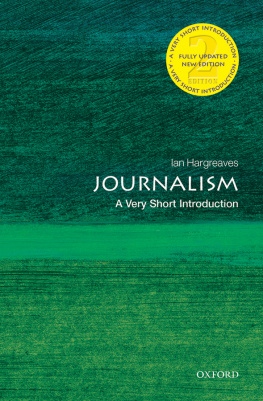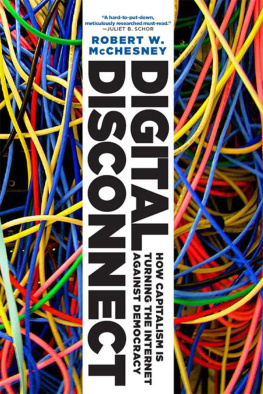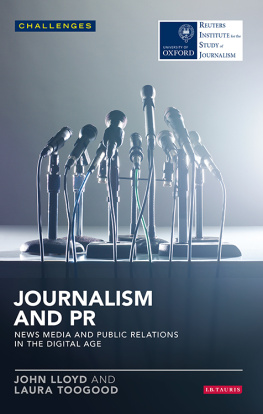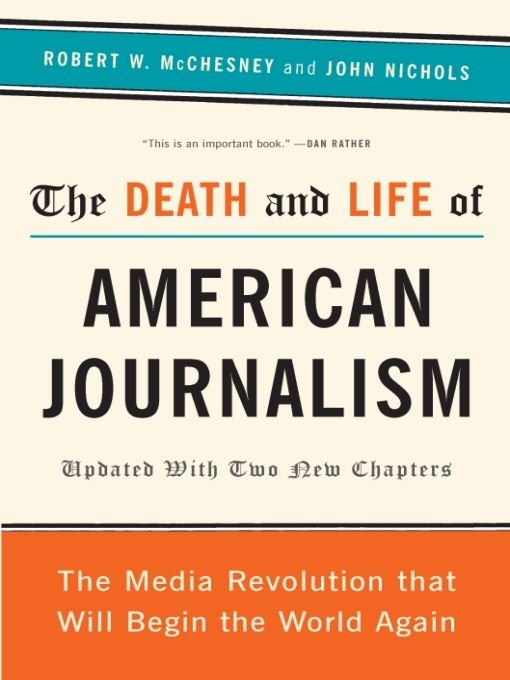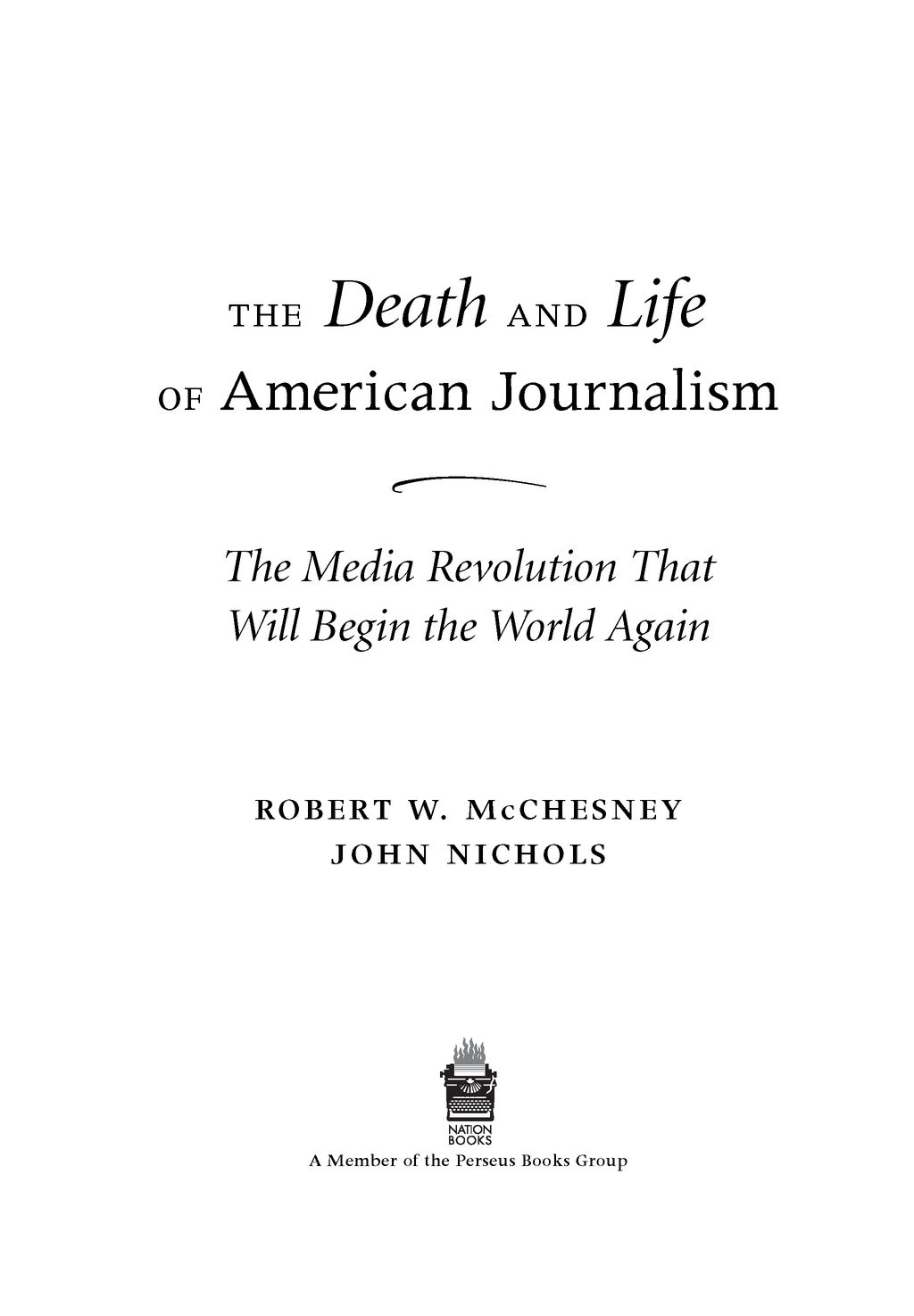Table of Contents
Praise for THE DEATH AND LIFE OF AMERICAN JOURNALISM
Winner of the Newspaper Guild Herbert Block Freedom Award
for Outstanding Contribution to Freedom of the Press
A Kansas City Star Book of the Year
A Booklist Editors Choice of the Year
A Progressive Book of the Year
A Choice Outstanding Academic Title of 2010
One of the 10 Most Important Info-Tech Policy Books of 2010 according to
Technology Liberation Front Blog
The authors argue passionately for radical solutions but also offer an exhilarating vision for the direction of American journalism.
Bookliststarred review
In The Death and Life of American Journalism, longtime practitioners Robert McChesney and John Nichols present a sober but ultimately hopeful analysis. Their solutiongovernment subsidies of newspapers to save a public goodwill make some journalists queasy, but extraordinary measures may be needed. It is hardly the only recent book on this urgent subject, but it is one I recommend. After all, when summers idyll is passed, we will again need the timely, independent reporting that newspapers still provide.
Rene Loth,Boston Globe
This well-written and thought-provoking book is sure to spark heated debate within the journalism community.
Library Journal
In this powerful book on the shrinking American media, the authors accurately explain its current crisis.
Publishers Weekly
After reading descriptions of the crisis that seem repetitive, an intelligent discussion about solutions seems in order. McChesney and Nichols deliver.
Minneapolis Star-Tribune
[McChesney and Nichols] provide a compelling blueprint for rejuvenating meaningful journalism in the US.
Choice
A provocative plan for rescuingand revitalizingnewspapers.
Kansas City Star
No one serious denies the extraordinary threat that journalism in America faces today. Nor can anyone serious ignore this extraordinary account of its source and solution. In this beautifully crafted and compelling book, McChesney and Nichols show us that the problem is not just the Internet. Nor is the solution just the Internet. Instead, the real answer to challenges that media face today is the same solution our Framers chose: public support for public media.
Lawrence Lessig,Harvard Law School
The field of journalism is in such profound crisis that it cannot even summon the energy to make a case for its own existence. Nichols and McChesney make that case with great persuasiveness and clarity; indeed no two people are more dedicated to the transformative, democratizing power of journalism not as it is, but as it should be.
Naomi Klein
This is an important book. It offers many new sunbursts of thoughtsome controversial but all adding to the dialogue about America and its free press crisis.
Dan Rather
McChesney and Nichols convincingly argue that responsible and responsive democracies require treating journalism as a public good to be subsidized, that the founders of the American experiment understood this, and that current crisis brought on by reducing journalism to a corporate commodity is also an opportunity to not only return to our roots, but to finally get it right.
Michael X. Delli Carpini, Dean, The Annenberg School for Communication, University of Pennsylvania
McChesney and Nichols are prophets of a free press for the digital age. Their book is the best depiction yet of the rapid disintegration of Americas old system of news. But this is a story of hope, not doom-and-gloom. The authors provide audacious yet wellcrafted solutions for how government tax and Internet policies can be used to bring about a new era of public service journalism, thus helping to save our democracy.
Juan Gonzalez, columnist for the New YorkDaily News,and co-host of PacificasDemocracy Now!
In this landmark history/diagnosis of our current journalistic crisis, McChesney and Nichols raise exactly the right questions, and offer us a range of sound solutions that are not just convincing but invigorating. With impressive erudition and rare analytical sophistication, the authors make clear that what Americans and journalism now require is nothing short of revolution, squarely based on the ideals of Jefferson and Madison and Paine, and yet adapted to an age of widespread digital empowerment.
Mark Crispin Miller, New York University
The stakes are huge, the time is now, read this book!
Phil Donahue
If you are concerned about the future of journalism in America (and you should be), then this book will help you understand where we are, how we got here, and what we need to do to help the handmaiden of a democratic republic regain her strength before she collapses and dies.
Roanoke Times
McChesney and Nichols make a case for media democracya case based on real political experience and plenty of knowledgethat no one else is likely to make as well. The Death and Life of American Journalism should set off alarm bells and also inspire a new generation of activism.
Tikkun
ALSO BY ROBERT W. McCHESNEY AND JOHN NICHOLS
Its the Media, Stupid (2000)
Our Media, Not Theirs (2002)
Tragedy & Farce: How the American Media Sell Wars,
Spin Elections, and Destroy Democracy (2005)
For Bill Moyers and David Austin
Preface to the Paperback Edition

In April 2010, three months after the hardcover edition of this book was published, one of the most thoughtful and well-regarded figures in American journalism, Karen Dunlap, the president of the Poynter Institute, testified before a Federal Communications Commission panel on the state of American journalism. She pointed to a fresh analysis of the media business by a Poynter scholar who calculated that the newspaper industry has lost $1.6 billion in reporting and editing capacity since 2000 or about 30 percent over that period. This comes from the sector that produces the vast majority of original reporting in local, national and international news. Even the many news start-ups replace only a small fraction of editorial capacity, and they, too, must find long-term sustainability. Then Dunlap repeated the conclusion of a just-finished Project for Excellence in Journalism report: Unless some system of financing the production of content is developed, it is difficult to see how reportorial journalism will not continue to shrink, regardless of the potential tools offered by technology.
For writers and activists who spend long periods trying to sound the alarm about a crisis, there come rare moments when their complaints are echoed in the corridors of power, when voices in the wilderness are suddenly integrated into the national discourse. In the spring and summer of 2010, as we toured the country and provided our own testimony to members of the FCC, the Federal Trade Commission and the U.S. House and Senate, we experienced such a moment. But we are not so nave as to believe that recognition equals transformation. And if there is a core message of this paperback edition of this book, it is that the circumstance of journalism in the United States continues to degenerate and that the degeneration threatens not just our ability as a nation to communicate fully and functionally but also democracy itself.


